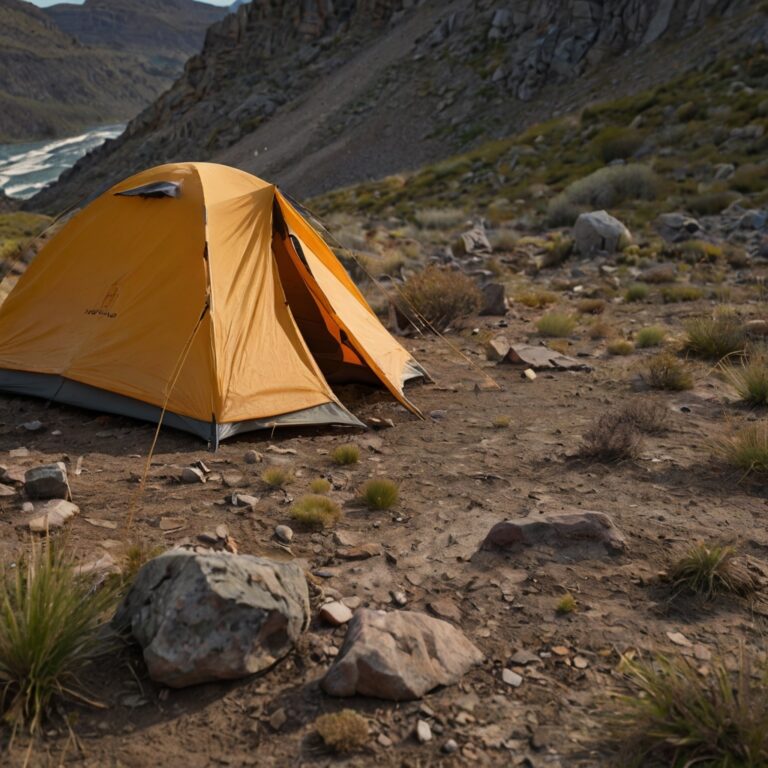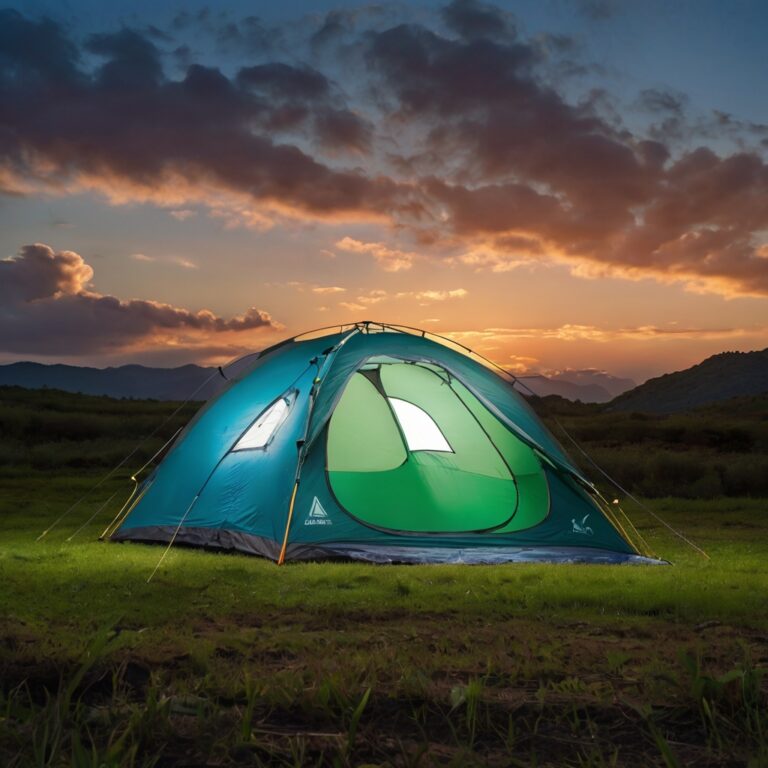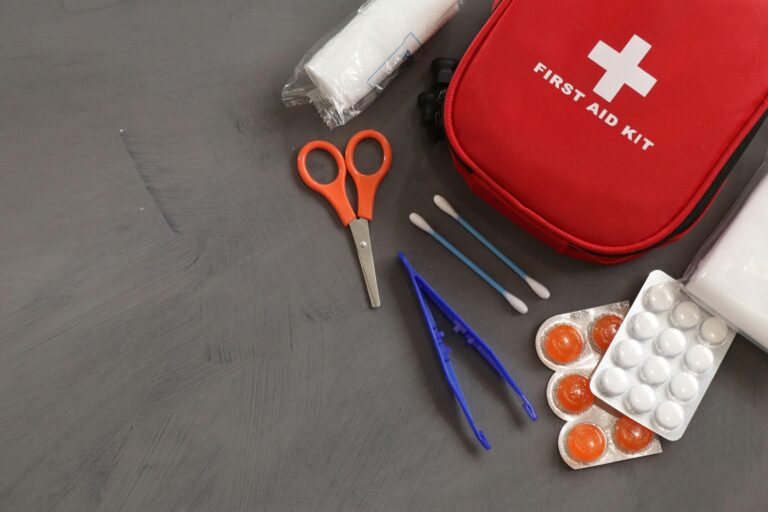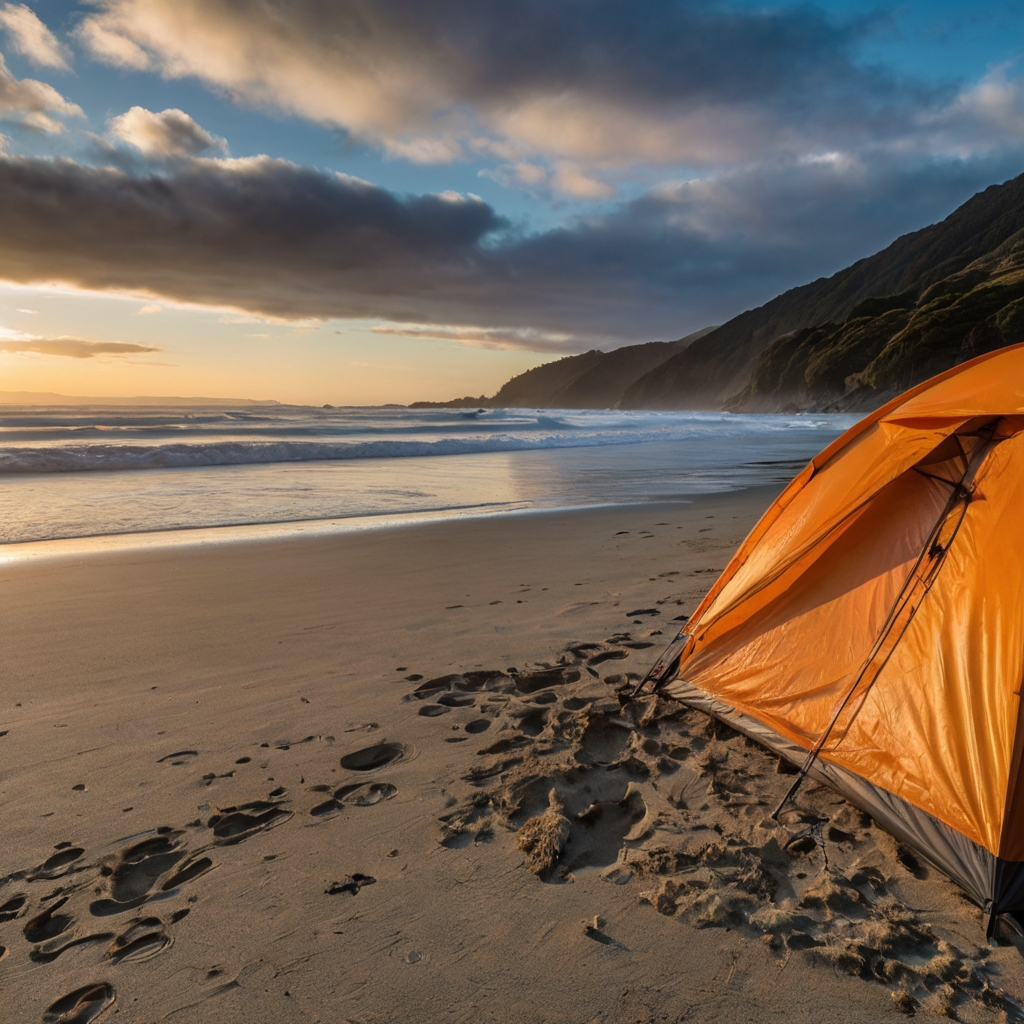
Kia Ora, fellow adventures !
Did you know that New Zealand has more than 200 DOC-Department of Conservation campsites scattered across its breathtaking landscapes ?
That is correct , Our beautiful country is a camper’s paradise !
Whether you’re a seasoned outdoor enthusiast or a curious newbie, there’s a type of camping experience waiting for you in Aotearoa.
From the rugged beaches of the Coromandel to the snow-capped peaks of the Southern Alps, let’s dive into the exciting world of camping Kiwi-style.
Get ready to pitch your tent, park your campervan, or cozy up in a glamping pod – your next unforgettable adventure starts here !
Types of Camping
- 1-Traditional Tent Camping : The Classic kiwi Experience
- 2-Freedom Camping : Embracing the Spirit Of Aotearoa
- 3-Campervanning: Your Home on Wheels
- 4-Glamping: Luxury Meets Nature
- 5-Backcountry Camping: For the Adventurous Soul
- 6-Beach Camping: Coastal Escapes
- 7-Holiday Parks: Family-Friendly Camping
1-Traditional Tent Camping : The Classic kiwi Experience
Ah, tent camping. It’s as Kiwi as Marmite on toast or complaining about the weather. I’ve been pitching tents since I was knee-high to a kiwi, and let me tell you, there’s nothing quite like it.
What’s Tent Camping All About?
For the uninitiated, tent camping is pretty much exactly what it sounds like.
You grab a tent, some gear, and head out into the great outdoors. It’s you, the canvas, and whatever Mother Nature decides to throw at you.
Trust me, she can be a real stroppy cow sometimes.
I remember my first solo camping trip. I thought I was Bear Grylls, ready to conquer the wilderness.
Turns out, I was more like a lost puppy.
I forgot half my gear and ended up using my socks as oven mitts. Not my proudest moment, but hey, you live and learn, aye?
2-Freedom Camping : Embracing the Spirit Of Aotearoa
If you’ve ever dreamed of waking up to the sound of waves crashing on a secluded beach or the gentle rustling of native bush, then mate, you’re in for a treat.
What’s Freedom Camping All About?
Freedom camping is basically camping for free on public land.
It’s about as Kiwi as it gets – embracing our stunning landscapes without the constraints of campground fees or bookings. But don’t be fooled, it’s not a free-for-all.
There are rules, and breaking them can land you in hot water faster than you can say “sweet as”.
I learned this the hard way when I first started out.
Thought I could just park up anywhere and call it a day.
Ended up with a hefty fine and a stern talking-to from a council ranger. Not my finest moment, but hey, live and learn, aye?
Where Can You Freedom Camp in NZ?
Now, this is where it gets a bit tricky.
The rules vary depending on where you are in the country. Some areas welcome freedom campers with open arms, while others have stricter regulations than my old high school principal.
In general, you’ll find more freedom camping spots in the South Island.
Places like the West Coast and Central Otago are pretty sweet for finding secluded spots. Up north, it’s a bit tighter, but there are still gems to be found if you know where to look.
One of my favorite spots has to be near Lake Pukaki. Waking up to views of Aoraki/Mount Cook reflected in those turquoise waters?
Choice, mate.
Just make sure you’re in a self-contained vehicle if you want to stay overnight.
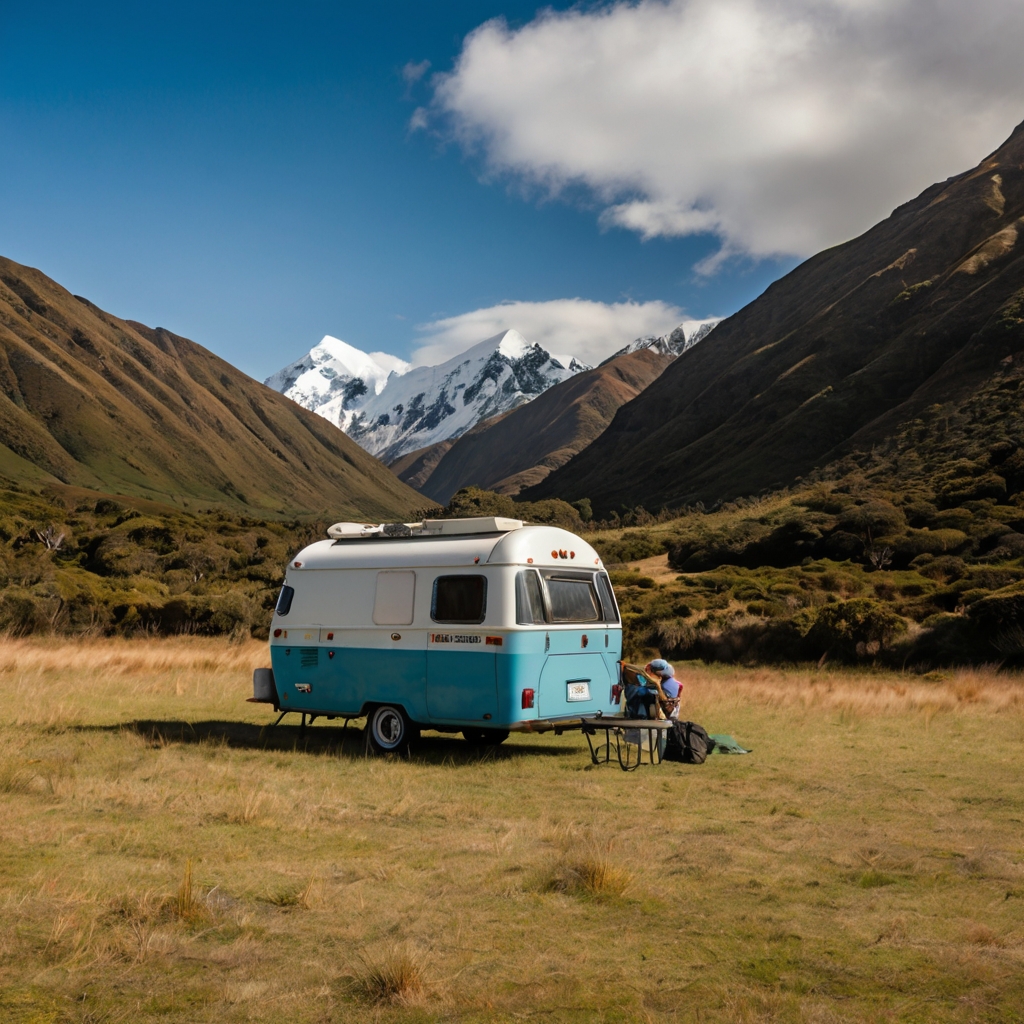
Respecting the Land and People
Here’s the thing, freedom camping is a privilege, not a right. We’ve got to treat Papatūānuku (Mother Earth) and the local communities with respect. That means:
- Always use designated areas. Don’t just park up wherever you fancy.
- Leave no trace. If you packed it in, pack it out.
- Support local businesses. Buy your supplies from small town shops when you can.
- Be mindful of noise. Not everyone wants to hear your rendition of “Slice of Heaven” at 2 am.
I once met an old Māori fella while camping near Hokianga.
He shared stories of the land and its people that left me in awe. It was a reminder that we’re not just visitors to these places, but caretakers.
Freedom camping isn’t just about saving a few bucks.
It’s about connecting with the land, challenging yourself, and embracing the true spirit of Aotearoa. It can be tough at times – I’ve had my fair share of soggy sleeping bags and 3 am possum encounters – but the memories you’ll make are priceless.
So, chuck your gear in the van, download a good camping app, and hit the road. Aotearoa is waiting for you.
Just remember to tread lightly and leave only footprints. Kia ora and happy camping, whānau!
3-Campervanning: Your Home on Wheels
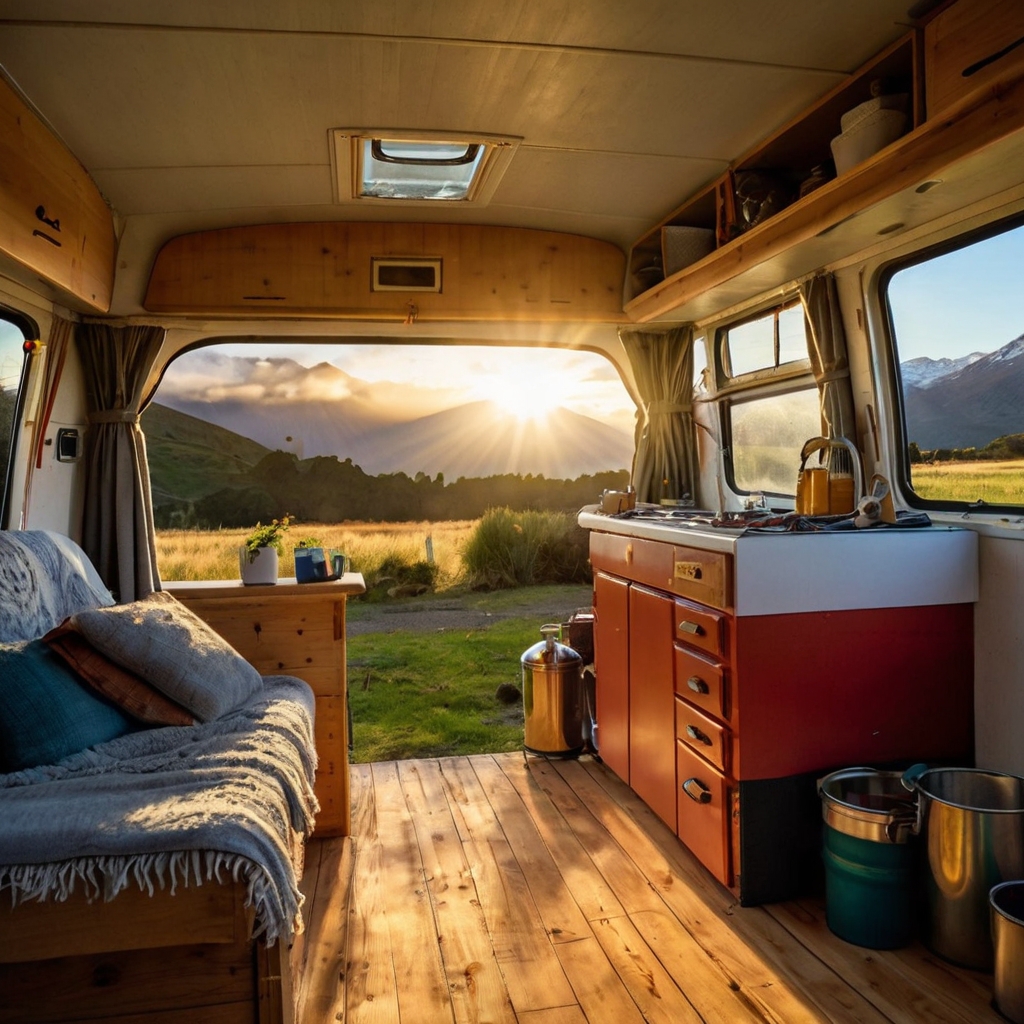
Okay, Now Let’s talk about campervans.
Imagine having your home, your transport, and your adventure all rolled into one.
That’s campervanning for ya. It’s like carrying a snail shell on your back, except this shell has an engine and can take you to some of the most breathtaking spots in Aotearoa.
I remember my first campervan trip like it was yesterday.
Rented a beat-up old van that looked like it had survived the ’80s (barely).
The thing rattled like a box of Tui cans going down a gravel road, but boy, did it have character.
Where to Take Your Campervan
The beauty of campervanning in NZ is that the whole country is your oyster. But if you’re after some top spots, here’s where I reckon you should point your wheels:
- Coromandel Peninsula: Beautiful beaches, great fishing, and enough twisty roads to test your driving skills.
- Queenstown to Glenorchy: The scenery along this route will have your jaw on the floor of your van.
- East Cape: Off the beaten track, full of Kiwi charm, and some of the best sunrises you’ll ever see.
Just remember, not all roads are created equal.
I learned that the hard way trying to take a massive campervan up a narrow, winding road to a “secret” beach.
Ended up having to reverse for about a kilometer. My arms still ache thinking about it.
Choosing Your Wheels
Now, when it comes to picking your home on wheels, you’ve got options:
- The Budget Beater: Think converted vans with a bed and not much else. Great for the wallet, not so great for the back.
- The Mid-Range Marvel: Usually a proper motorhome with basic amenities. This is your sweet spot for comfort and affordability.
- The Luxury Liner: All the bells and whistles. Shower, toilet, kitchen – the works. It’s like taking your bach on the road.
Pro tip: Always, ALWAYS check the vehicle thoroughly before you set off. I once picked up a van without checking the spare tire. Let’s just say, when we got a flat in the middle of nowhere near Haast, things got… interesting.
4-Glamping: Luxury Meets Nature
So, Let’s combine camping with a luxury , Interesting right !
Glamping, for the uninitiated, is “glamorous camping“.
It’s for those of us who love nature but aren’t too keen on nature loving us back – you know, with its bugs, hard ground, and lack of hot showers.
My first glamping experience was a revelation. But before going out, i read a full Guide about Glamping, as it was a new experience for me.
After years of roughing it in tents, I felt like I’d stumbled into outdoor nirvana. A proper bed, a heater, and – praise be – a private bathroom.
I nearly cried tears of joy. Nearly. Kiwi blokes don’t cry, we just get something in our eye, right?
Types of Glamping Accommodation
Now, when it comes to glamping, you’ve got options that’ll make your standard DOC campsite look like a cave dwelling:
- Luxury Tents: Think canvas palaces with proper beds, rugs, and maybe even a chandelier. Fancy as.
- Treehouses: For when you want to unleash your inner kid, but with wine.
- Pods: Futuristic little bubbles of comfort, often with panoramic views.
- Yurts: Circular tents that are way more stable than my first flatting situation.
- Converted Vehicles: From helicopters to train carriages, if it’s quirky and comfy, someone’s turned it into glamping accommodation.

I once stayed in a converted sheep wagon. Sounds rustic, but let me tell you, those sheep were living better than I was in my first flat in Wellington.
So, pack your designer gumboots, charge your phone (because yes, many glamping spots have power points), and get ready for a uniquely Kiwi luxury experience.
Whether you’re nestled in the bush, perched on a hillside, or tucked away on a secluded beach, glamping in Aotearoa is an experience you won’t forget.
Just remember, no matter how fancy your tent is, the possums don’t care. They’ll still try to steal your food. Some things in New Zealand never change!
5-Backcountry Camping: For the Adventurous Soul
This isn’t your average DOC campsite experience – we’re talking proper bush-bashing, river-crossing, mountain-climbing adventure.
If you’ve ever wanted to feel like a true Kiwi pioneer, this is your chance.
What’s Backcountry Camping All About?
Backcountry camping is the real deal. It’s about getting off the beaten track, away from the crowds, and deep into the heart of New Zealand’s wilderness.
We’re talking places where the only facilities are the ones you carry on your back, and your closest neighbours might be a family of kea or a curious weka.
My first backcountry trip was a real eye-opener.
I thought I was fit until I tried to lug a pack that felt heavier than a sheep up a mountain track. By the end of the day, I was knackered, but the views… mate, they were worth every gruelling step.
Backcountry Etiquette: Leave No Trace
When you’re out in the backcountry, you’re a guest in nature’s home. Here’s how to be a respectful visitor:
- Pack it in, pack it out. If you carried it in full, you can carry it out empty.
- Stick to the tracks. Creating new ones damages the environment.
- Use biodegradable soap and wash at least 50m away from water sources.
- If nature calls and there’s no toilet, dig a hole at least 15cm deep and 50m away from water. And for goodness sake, bury your business when you’re done.
I once came across a campsite where someone had left their rubbish behind. Ended up packing it out myself.
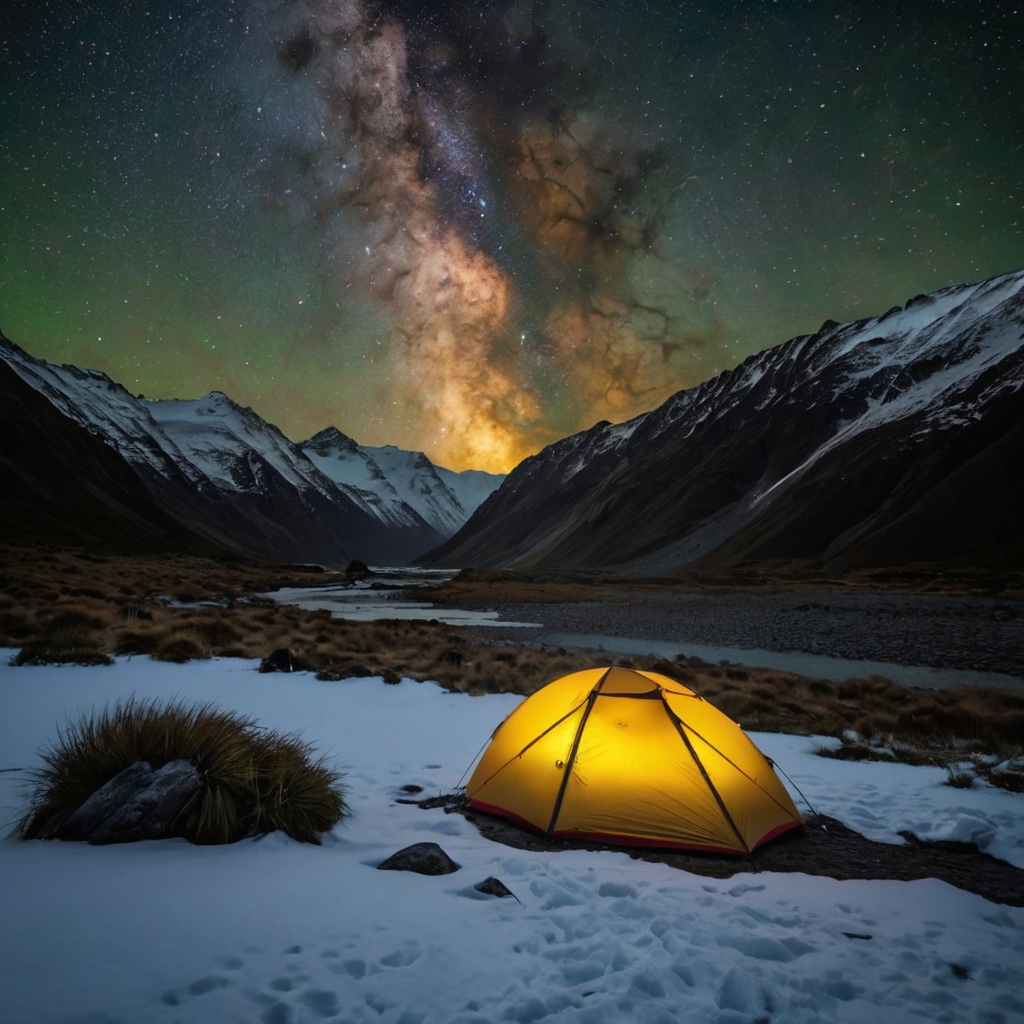
Safety First, Adventure Second
Backcountry camping in NZ is no walk in the park. Our weather can turn on a dime, and our terrain can be unforgiving. Here are some crucial safety tips:
- Always let someone know your plans and when to expect you back.
- Carry a PLB and know how to use it.
- Check the weather forecast and track conditions before you go.
- Be prepared to turn back if conditions aren’t safe.
- Know your limits. The mountains will still be there another day.
I learned this the hard way when I pushed on despite deteriorating weather. Ended up in a pretty hairy situation crossing a swollen river.
Lesson learned: the mountain doesn’t care about your ego or your plans.
6-Beach Camping: Coastal Escapes
There’s something magical about falling asleep to the sound of waves and waking up with sand between your toes.
I remember my first beach camping trip in the Coromandel. Thought I was clever pitching my tent close to the water.
Turns out, tides are a thing. Woke up in the middle of the night floating on my airbed. Not my finest moment, but a good yarn for the BBQ.
Top spots for beach camping? You can’t go wrong with:
- Maitai Bay, Northland: Crystal clear waters and stellar snorkelling.
- Totaranui, Abel Tasman: Golden sands and native bush. Chur!
- Purakaunui Bay, Catlins: Rugged coastline and epic surf.

Beach camping comes with its own set of rules:
- Always check if camping is allowed. Some beaches are no-go zones.
- Respect the dunes. They’re not your personal playground.
- Take your rubbish with you. Let’s keep our beaches clean, aye?
- Be mindful of wildlife. Those little blue penguins aren’t interested in sharing your tent.
Whether you’re into surfing, fishing, or just lounging about, beach camping is the ultimate way to experience New Zealand’s coastline.
Just watch out for those tides, and you’ll be sweet as!
7-Holiday Parks: Family-Friendly Camping
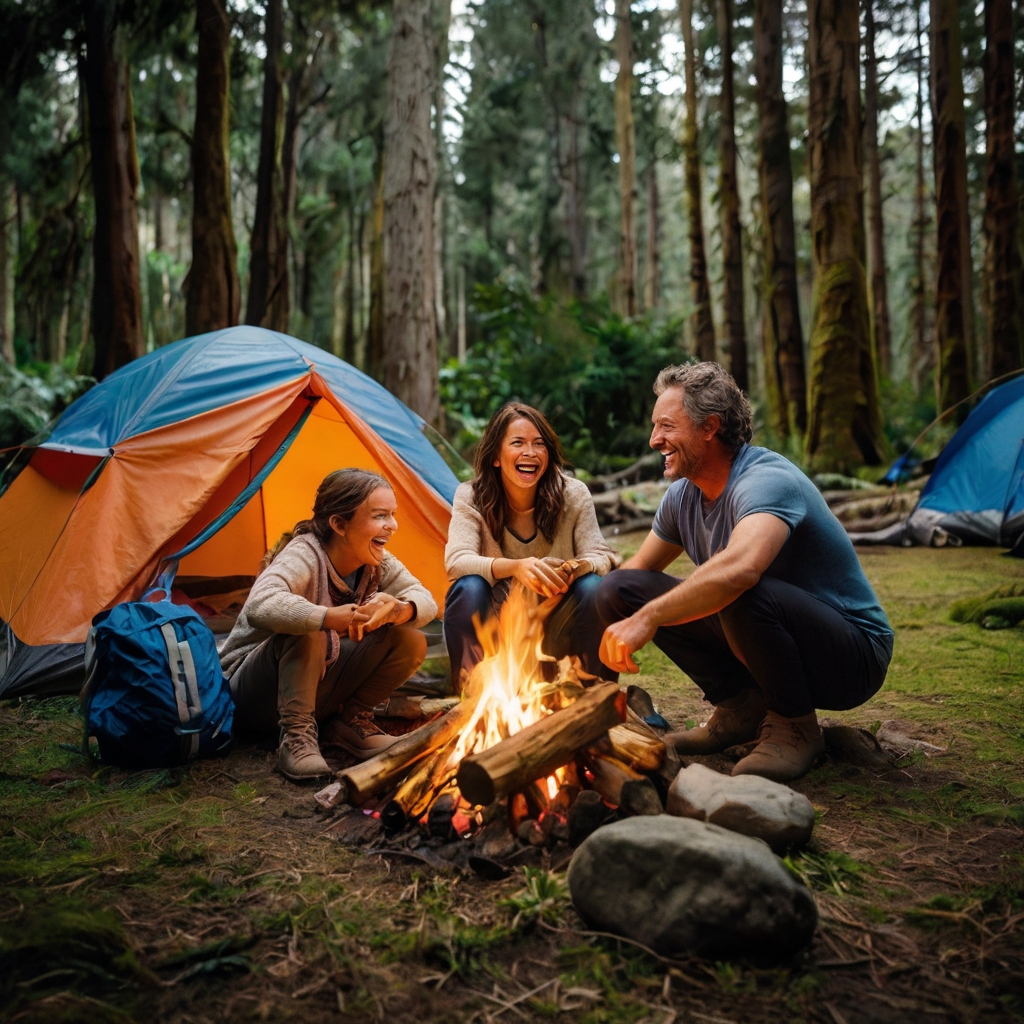
Holiday parks are like the Swiss Army knife of accommodation.
You’ve got your powered sites for campervans, tent sites for the traditionalists, and cabins for those who like a solid roof.
It’s camping with training wheels, perfect for families or those who aren’t keen on roughing it.
I’ll never forget taking my kids to their first holiday park. They were buzzing more than a bee in a Manuka tree – playground, pool, and a TV room for rainy days.
I was just stoked about the hot showers and actual toilets But do not forget your camping chairs !!
Some top-notch holiday parks:
- Tahuna Beach Kiwi Holiday Park, Nelson: Beachfront location and epic playground.
- Rotorua Top 10: Geothermal pools and close to all the touristy bits.
- Queenstown Top 10: Stunning views and great base for adventure activities.
Why holiday parks rock:
- Facilities galore: Kitchens, laundries, BBQ areas – you name it.
- Kid-friendly: Most have playgrounds and activities to keep the little ones busy.
- Social vibe: Great for meeting other families and swapping travel tips.
- Location: Often in prime spots close to attractions.
Holiday parks are a great way to ease into camping or just have a stress-free family holiday. You get the outdoor experience with a safety net of facilities.
It’s like camping, but with less chance of the kids having a meltdown over long-drop toilets. Choice!
Wow, what a journey through New Zealand’s diverse camping landscape!
From the simplicity of pitching a tent under the stars to the luxury of glamping with all the mod cons, there’s truly something for every outdoor enthusiast in Aotearoa.
Remember, whether you’re freedom camping on a secluded beach or cozying up in a holiday park, always practice the Kiwi way – respect nature, leave no trace, and embrace the spirit of adventure.
So, which type of camping will you try on your next Kiwi escapade?
Pack your bags, grab your map, and get ready to create memories that’ll last a lifetime in New Zealand’s great outdoors.
Happy camping, mates!
FAQ
Q1: Do I need a permit to camp in New Zealand?
A:It depends on where you’re camping. Freedom camping and some DOC sites are free and don’t require permits. However, many campsites, especially in national parks or popular tourist areas, require bookings and may have fees. Always check local regulations before setting up camp.
Q2: What’s the best time of year for camping in New Zealand?
A: The best time depends on your preferences, but generally, summer (December to February) offers the warmest weather. Spring (September to November) and autumn (March to May) can be lovely with fewer crowds. Winter camping (June to August) is possible but requires proper gear and preparation.
Q3: Are campfires allowed in New Zealand?
A: Campfire regulations vary across the country. Many DOC sites and campsites prohibit open fires due to fire risk. Always check local rules and fire bans. In areas where fires are allowed, use designated fire pits and follow all safety guidelines.
Q4: What wildlife should I be aware of when camping in New Zealand?
A: New Zealand has no large predators, but you should be aware of:
- Kea: These intelligent alpine parrots might try to steal or damage your gear.
- Sandflies: These small biting insects can be a nuisance in some areas.
- Possums: While not dangerous, they can be noisy and may raid unsecured food.
Q5: Is freedom camping legal in New Zealand?
A: Yes, but with restrictions. Freedom camping is only allowed in designated areas, and you must use a certified self-contained vehicle in many locations. Always check local bylaws and respect the environment.
Q6: What should I do with my rubbish while camping?
A: Follow the “Pack it in, pack it out” principle. Many campsites don’t have rubbish facilities, so be prepared to take all your waste with you. Practice Leave No Trace principles to preserve New Zealand’s beautiful environment.
Q7: Can I rent camping gear in New Zealand?
A: Yes, many outdoor stores and some i-SITE visitor centres offer camping gear rental. This is a great option if you’re travelling from overseas or don’t want to invest in your own equipment.

